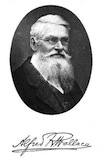 Evolution
Evolution
Alfred Russel Wallace and His Detractors
 Current Biology has just published four articles in honor of the centennial of Alfred Russel Wallace’s passing that are cause for praise and pity. First the praise. Darwin biographer Janet Browne presents a brief but illuminating sketch of the personal relationship between the two naturalists. Despite an association that could have turned ugly, Browne points out that these men who shared the honor of discovering natural selection always remained cordial and mutually appreciative despite some fundamental and irreconcilable differences over certain evolutionary principles, especially the explanatory power of natural selection (it was Darwin not Wallace who was actually the "hyper selectionist"; see "Gould’s Fatal Flaw").
Current Biology has just published four articles in honor of the centennial of Alfred Russel Wallace’s passing that are cause for praise and pity. First the praise. Darwin biographer Janet Browne presents a brief but illuminating sketch of the personal relationship between the two naturalists. Despite an association that could have turned ugly, Browne points out that these men who shared the honor of discovering natural selection always remained cordial and mutually appreciative despite some fundamental and irreconcilable differences over certain evolutionary principles, especially the explanatory power of natural selection (it was Darwin not Wallace who was actually the "hyper selectionist"; see "Gould’s Fatal Flaw").
Then James Wood reviews Wallace as a writer and concludes that he was Orwellian, in the good sense, with "that [same] cool, all-seeing eye, that instinct for narrative, the frequent dark humour, the socialist politics, the humane breadth of vision" that was part of "a long radical English tradition full of sharp, pungent individuals."
Also worth reading is James T. Costa’s article that follows Wallace’s adventures in the Malay Archipelago and Amazonia, setting him on a track as radical and divisive as the socialism he would later profess. One has to appreciate these brief but valuable contributions to the veritable explosion in Wallace studies over the past decade or so.
But just when you think some real progress is being made, Andrew Berry demonstrates the truth of the old adage, "The more things change the more they stay the same." In "Alfred Russel Wallace — natural selection, socialism, and spiritualism," Berry states:
The contrast with Darwin is striking. After publication of The Origin, Darwin’s strategy was to consolidate and concretise the arguments laid out in his seminal work. His output remained resolutely scientific. One of the many reasons that Wallace has been so comprehensively eclipsed by Darwin in the standard telling of the evolution story may be that we prefer our scientists to stick to science. There is something laudably dedicated, almost puritanical, about Darwin’s single-minded devotion to his scientific cause, whereas Wallace’s scattershot embrace of every needy underdog under the sun smacks of dilettantism.
Actually it is Berry’s dismissal of Wallace’s interests in spiritualism and socialism as "scattershot" that is dilettantish. In fact, whatever the merits or demerits of either, both movements were powerful intellectual currents in Victorian England that captured the hearts and minds of important and influential leaders including Robert Owen, Frank Podmore, and the Rev. John Page Hopps. As for science, Wallace’s Geographical Distribution of Animals (1876) made biogeography a discipline in its own right, and recently his work in anthropology has been deemed far superior to Darwin’s (see here) with Loren Eiseley observing more than fifty years ago that "anthropologically speaking, Wallace was somewhat in advance of his confreres, and made undisputed contributions to our common scientific knowledge" (Darwin’s Century, p. 257). Berry’s article is a pity, an unfortunate step backwards in the historiography of Wallaceana.
Even more revealing is Berry’s claim of "Darwin’s single-minded devotion" to science. This is absurd. There can be little doubt that Darwin’s writing is suffused with metaphysical assertions. Referencing Darwin’s notebooks, David Kohn has written, "Thought is a secretion of brain. Even the idea and love of God, the essence of faith, is an ‘effect of organization,’ a secretion of brain. It is not far from here to Darwin’s position in the Descent of Man that the idea of God is a human projection, a manifestation of our anthropocentric arrogance" (see his "Darwin’s Ambiguity: The Secularization of Biological Meaning"). In Darwin’s hands, teleology is secularized and given over wholly to natural processes. This is not science — it is a metaphysical commitment to naturalism.
Darwin is remembered not because "we prefer our scientists to stick to science" but because naturalism and the methodology that underpins it came to be "preferred" by many intellectuals, academics, and modern media outlets. Darwin’s science is full of theological and metaphysical statements and speculations. The choice between Darwin and Wallace is, in fact, not a question of science but a question of competing worldviews. (For a fuller discussion, read Cornelius G. Hunter’s trilogy, Darwin’s God, Darwin’s Proof, and Science’s Blind Spot.)
Berry’s short piece reveals how far we’ve failed to come in understanding Wallace. While good work has been done recently on Wallace by scholars such as Martin Fichman and Ross A. Slotten, Berry’s treatment merely restates the derision Wallace himself experienced at the hands of scientistic colleagues of the Victorian and Edwardian eras. Perhaps the real reason Wallace isn’t as well remembered as Darwin is that he has "friends" who damn him with faint praise and do their best to keep him in Darwin’s shadow.
In the end, what evidence does Berry have for Darwin’s metaphysical assertions that the complexities of nature (let alone the human mind) can all be explained by blind processes of chance and necessity? Granville Sewell’s clever but telling answer should embarrass Berry into silence. It should, but won’t. For Darwinists belief trumps everything, even in the absence of evidence.
